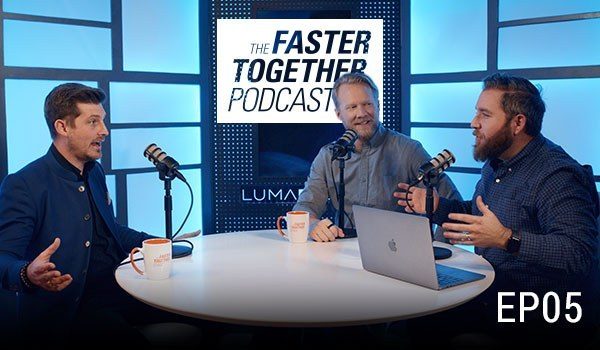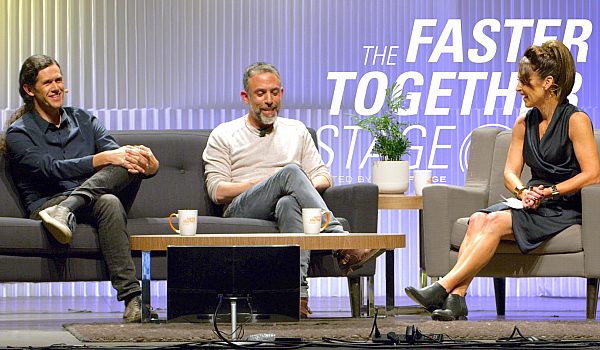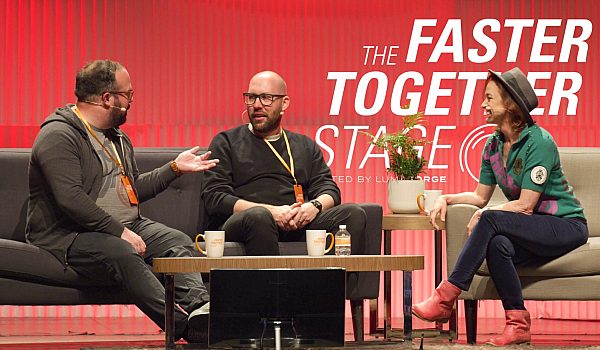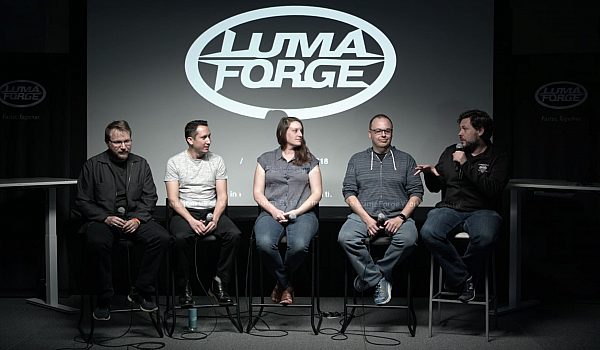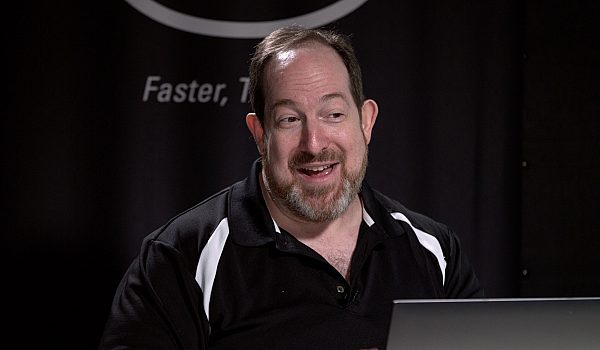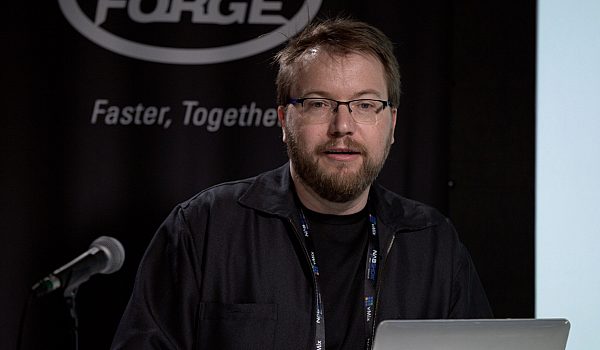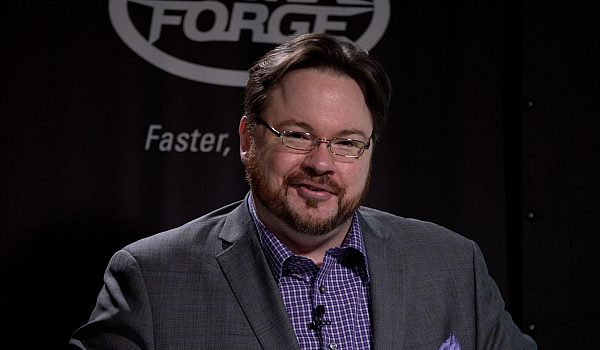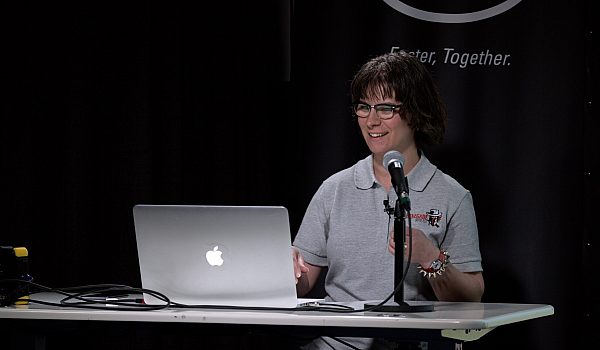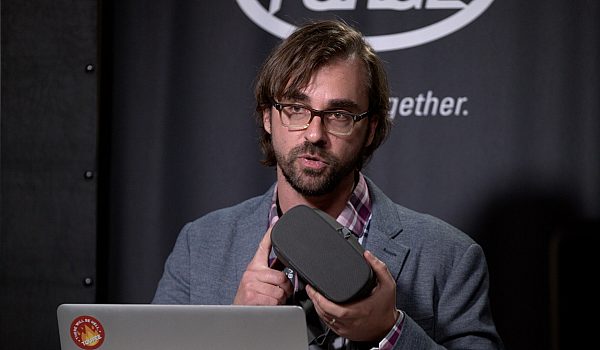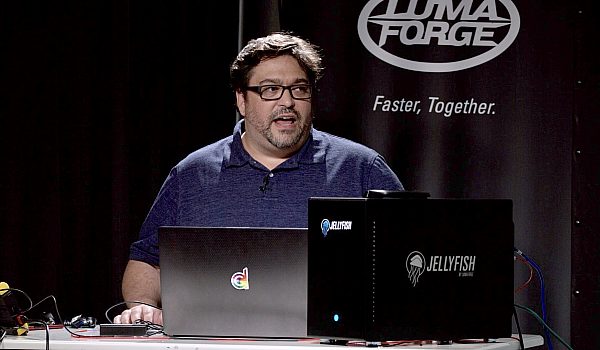After a recent announcement about the potential future of MacPros, Apple fans rejoiced. But now is not the time to coast. Instead, Pro users should continue to press Apple for the functionality we want, so that we can continue to push the boundaries of creativity.
Michael Cioni, from Light Iron and Panavision gives a rousing presentation on how and why we should come together to push Apple to again make the best products for post production professionals.
All right. Thanks everybody. Good morning. Happy to be here. They're really excited and definitely want to talk about, I think an important subject for all of us because it's going to transcend a lot of different categories. And the way that I'm sort of identifying it is from a personal perspective, this idea, do I have Stockholm syndrome with Apple? Is there a psychological appreciation or attachment to this company that is affecting my choices, my behavior and my responses and my predictions and my hope and my desires and my actions and my words. And that's kind of what Stockholm syndrome is. If you think about, um, I know it's kind of a, it's a funny way to look at this thing because we're going to talk a lot about emotions because emotions drive what we do. Emotions represent who we are and who we are is always going to be in what we do.
We can really not separate who we are from what we do. It just always will bleed in. And I think Apple is a great example of a company that understands that, think about this idea of Stockholm syndrome. To start that we kind of got to think about what it is. Well, it's a survival strategy forming a bond during an intimate time that is spent together. Think about that in terms of our relationship with our work and our tools, right? You invest so much of your own personal time, you invest so much of your own personal products. All of these things are strategic because you have a bond, you found a bond with something that you're really, really strongly attached to. And that bond over time grows and grows and it impacts how you think. And so I think the idea Stockholm syndrome is an appropriate category to put this in because we have such a relationship with Apple.
And of course Apple isn't a person. Apple is not a someone that we can touch or taste or really feel. We only respond to the products that they put in our hands and they know how to do that. And they probably do it arguably better than anyone else. And because of that, an emotional bond is formed that is different than almost any other company when, especially when it comes to technology. So I think when I'm in identifying how I feel about what's happening with changing, I'm thinking about having this survival strategy that I say and do things based on my emotions, not just based on my, uh, physical interaction. I think it's fair to start with something that Apple does really, really well and this is something that they've had for almost 20 years and they've shared this with people. So this is not my words or my interpretation.
This is their as, and it's important to understand that Apple categorically recognizes that they have different customers in different sectors and in the types of computers that we use, they break them down into a consumer and a professional category. And then they separate that from desktops and mobile notebook systems. And so just the core understanding of this is critical because this is an old photo, but they still use it because it represents the same a decisions in the same driving force behind where they're going. And that's really important because I actually hope that this maintains decades to come and I hope they keep the products from this era because I think it's telling that if you can apply this same principle, five 10 1520 years down the line, and it still holds through from the original graphic, I think that's good. It shows that it's strong.
So I think it's important to understand that Apple has a lot of pressure on them also because everybody wants a product directly for them. Everybody wants the perfect product, everybody wants the product directly for them, but they've got all these different groups of people to service. And when you feel like you're not being serviced, you blame them because you're like, well, how come I'm not being serviced? It's like if I were, if Apple were a person, they would be like, Hey, I'm, I have so many children. I don't know how to take care of them all. You know? And so that's kind of, we've got to understand from their perspective, they have hundreds of millions of, of children that all have a need. But we feel in the professional motion picture and television and communication and media industry that we deserve more attention, that we're more important than maybe the brother or sister we have sitting next to us.
Right? And that leads to this attraction and this appropriation and an expectation of what Apple should do for me. What do I deserve from this company? I give them my money, I give them everything, I support them, I defend them. What do I get out of it? Right? So I want to next go into separating exactly who I'm talking about because in order for this to make sense, someone somewhere will see this and I may not be talking specifically about you. So I want to understand, I want to help understand exactly what I'm talking about. There are the professional motion picture, entertainment and content creators. And I even break those down. So this is not medical, this is not school, this is not hobbyists. This is people that consider this their job, that working with computers in storytelling in some fashion. This is your job.
And I break that down into two different sort of versions. There's the do it yourselfer and the professional. Now what's similar about these two groups is both groups have to accomplish these goals. They've got to have storage, they've got to manage all that data. They have to be able to edit it and color it and mix it and publish it. That's common amongst both groups. The major difference between these two groups is the do it yourself or is able to identify a product that allows that all to happen on basically one machine and then the professional infrastructure has to be scalable and because you're, when you're working with larger scale, you have to have an independent person essentially handling all these things and the larger you scale up your product or process, the more people requires to do that. I'm focusing right now on, on both of these groups and I belong in both of them.
In fact, most of you in this room and watching this probably belonged to both of these because even in my own products and my own projects, I can just use one product and I can do my management, my edit, my storytelling, my mix and color and publishing on one system. And I have done things that hundreds of thousands of people have viewed or seen and they all just come out of this laptop and I have everything I need in this one piece and that's where the do it yourself or wins. But then I have another side of my business and many of you probably have that too where you have to scale up and it's beyond the single person. And that's where I want to focus the next part of our topic. Does that make sense? Do we understand the ground rules? Okay. Shakespeare said, what is past is prologue.
And so I want to give you a little personal historical examination of my story because I can only really share appropriately or or specifically about what I experienced and how I feel. And so my story basically starts back in 2003 in a good friend of mine, Ian vert evac and Steve Barris started a company, a few people called plaster city and back in 2003 we started this little company and it was a desktop solution shop and it was all Apple based and at that time in Hollywood where we were working on the sunset Boulevard, there wasn't really an infrastructure for Apple in the professional sector for motion pictures at that time. Seeing a bunch of Apple driven computers and software technologies was not common in Hollywood in 2003 at that time we started moving big into the Exxon systems and the X serves and the x-rays and all of that stuff was really new for Apple at the time too.
And they were pushing incredible hardware, incredible performance for the time. And I remember unboxing these things and assembling these things. We had this area that we would put it all together and clean it up and I and and learn how to network and build all these elements together. And the photo on the right was Steve Barris. There is really significant because we started doing four, four, four RGB on compressed 10 bit, 10 80 P and in 2003, those numbers and letters I just said were very, very exclusive, very hard to do anywhere, let alone on a store bought consumer available computer system. That was the beauty of the infrastructure at its beginning. And I wasn't the only one. I want to give credit to two other groups, Rami, Katrina and Mark Peterson at DFT and off Hollywood also recognized the same thing, ended about the same time.
And I'm sure there are European partners that I wasn't aware of at the time that were doing this, but in North America, myself and Rami and Mark all had the same understanding and we identified the same opportunity and we all started companies, which are all still around by the way. Um, well plaster city changed its name and now it's called light iron. But um, essentially these are the same groups of people and we all sort of are still friends and talk regularly about this. So this all kind of happened as a movement. And then another thing that was really interesting is that the height of all of this was final cut studio too. And we actually got invited to be a part of that launch. And so there's Steve and I on the stage here at NAB exactly 10 years ago today delivering final cuts, studio two with Michael Wong and a bunch of other Apple people and, and Bill Hudson, a few other key people at the time.
And it was one of the most proudest moments I've ever had in my life to be invited by Apple to be a part of this launch and this release in this new era of software and hardware taking over NAB, this place where the professional incumbent groups that had been around for two or three times longer and had infrastructures that were so much bigger for professionals. And here Apple just just owned it. And I remember just feeling so excited about all that. Since then, even more recently too major, a final cut pro 10 projects, a movie called focus and one called whiskey tango Foxtrot. We did relationship groups with Apple and we did events with them and we were in this bond with Apple and displayed how the final cut 10 infrastructure and the IMX and the Mac pro systems were able to work in a really powerful database for Hollywood motion pictures, which was great.
We had great turnouts and great attendance for people seeing that. So back in 2003 my infrastructure was a hundred percent Apple based. We relied a hundred percent on Apple. And the reason we did that was technical. When we evaluated the infrastructure opportunities and the quality that we could achieve. Remember, this is a world of videotape in 2003 I remember the person that used to clean my VTR. So we had to hire people to come and clean the VTR heads, right? And he turned to his left, saw this six foot tall rack of blinking lights. He goes, what's that? And I go, it's our sand. And he goes, what's the sand? And I said, well, it's basically like that sr deck you're cleaning, but it's like 20 of them in one sand for the same price. And he goes, that'll never work. And I'm like, all right, well we'll see.
And um, that's a true story. And so it was very technical in nature because we were able to produce four, four, four, 10 bit uncompressed material in an edit timeline that could offline and online in the same infrastructure, same system, and we could have five or 10 computers doing that all at the same time. That in 2003 was profound and Apple was the only company that was able to let us do that. But then over time the infrastructure changed. And over time, as I became more and more pro and my clientele grew and my interest and my qualitative requirements grew, my reliance on Apple went down and the ability to maintain certain qualitative needs that I required couldn't necessarily be served by Apple products. And so even though I wanted to have the Apple product serve these things, as I started light iron and then opened up New York, and then so my company had Panavision and started building the camera, the millennium DXL.
Now we're about 30% reliant on Apple products. Where a little over a decade ago. We were a hundred percent reliant and we were 100% served by them. Now, if nothing were to change, then this is what the model would look like. If nothing changes in the status quo. In my personal story, it means that over the next five or six years we're going to have zero reliance on Apple. There won't be any Apple computers in my infrastructure. That's again, if nothing changes, this line is just, if I just continued it off, this is what it would look like. So I could almost predictively say right now there won't ever be an Apple need in my market in the year 2023 2024 but I think things are going to change and I think groups like this and topics like this can help make that change because what started out and why we, many of us come to Apple starts technical, right?
I went to Apple for technical reasons in 2003 up through 2009 but the reason I stayed there is emotional. I stick it out with Apple because of my emotions, not because of the technology, because I get invested in this bond and this relationship and the feel good experiences of all the good things that have come out of my relationship with them. And I love that. But also my ecosystem and reliance on Apple grows, right? Because now I have more and more parts of my life are emotionally invested in their product with my music, in my social media and my personal computer and all those things. And all of a sudden why I started with this group for technical reasons, transitioned to staying with it for emotional ones. And this is where the rubber starts to get a little friction, right? Because when we make decisions purely emotionally, sometimes I know someone out there has made an emotional decision in their life.
And maybe sometimes that changes the logic of why you should or should not have made that decision. So can we identify some patterns that led to this? And I want to show a couple ideas and put some ideas in your head because I think the world's full of patterns and we have a great scale to look at because we can start looking at a 20 year scale. It's 2017 and I think something very significant happened in 1997 when Steve jobs returned back to Apple right before that and we have a 20 year scale, 1996 1997 through 2017 if we look at that, I think there's an interesting pattern that emerges that I found. So if we first look at consumer electronics in the Apple ecosystem, look at what's really interesting as Steve comes back in 96 into 97 they start the iPod program and then the iPod basically grows all the way until it transitions in hands off to the iPhone and that all happens basically in 2008 and 2009 and this iPod revolution just that it got so much momentum.
Apple sold in 13 years, 390 million iPods. This is handed off into the iPhone era, right around 2008 2009 and of course the stock makes a huge jump and splits it at this time. Now we look at our final cut pro users and amazing metric here. 1999 we got final cut pro beginning and then it goes basically every year and every other year, all the way through 2009 where we see all of this incredible growth. And one of the most important statistics, Apple claims that 49% of the U S market use final cut pro in some capacity for editorial. I believe that to be true, it's, it's hard to prove that, but that's what they claim about half the people that edited something in the world for whatever it was you was final cut. I believe that's probably accurate. I know, uh, Luke will tell us most people didn't pay for that product, but they had access to it somehow.
So you know, whether they used it or Apple made money off it are two different stories. But I think that's, you know, they were at fans and then I think one thing that's really significant is the motion picture editors Guild claims that about 20% of their users at this 2009 era were using final cut. So there was this a massive change in push against avid and premiere basically didn't have, they had very low single digit numbers at that time for editorial. And this was this peak and this peak right around 2009 was really significant. And remember the last interesting data point was from 2009 and then this interesting data point comes from 2009 and then we move into the final cut 10 era. Then look at the desktops, look at the desktop programs, very, very strong and bunched up in the late 1990s early two thousands more often.
But then one of the best computers and some would argue the best computer Apple ever released came out in 2009 there's a number again and this was like the strongest computer. And a lot of people today still use that computer as their premier computer all the way back from 2009 that's still their favorite and it's they're still running and it's actually really amazing. Just for a moment, if you think about computer technology, people know has very short lifespans, but the fact that people are relying on an Halem Intel today is really remarkable because it can still do the job many, many, many years later, almost a decade later, which is rare when you think about that people are not shooting on digital video cameras from 10 years ago anymore. People don't have phones from 10 years ago anymore. People barely have televisions from 10 years ago. Yet our professional desktop solutions was amazing in 2009 and then we look at my story again.
Well, I actually started my latest company in 2009 and so this becomes part of a, a bunch of intersections and this year 2009 keeps popping up in all of this data that I see about my relationship, technical and emotional with Apple, and I believe that maybe some of you could look back at your life and look back at the things you've experienced in 2009 I believe is a pivotal year. I think a whole bunch happened and when the changes started to take place, some people wanted to stay with Apple. After 2009 and some people started to leave, some people decided to complain about what's happened since 2009 other people want to focus on how to improve it and we have a choice. Some people are still editing on the Halon computers with final cut seven and so they want it to be 2009 other people have left and said, I'm going to windows, I'm going to HP, I'm going to avid, I'm going to premiere.
And they didn't stick it out very long at all. They didn't have a very strong pain tolerance and they left. And then everyone else is probably somewhere in between. You're either editing on final code seven like it's to a decade ago or you've said goodbye a long time ago and you're definitely not watching this. So, uh, you know, you're in, the rest of us are probably somewhere in between. And so I think it's important to understand, first of all, that there is a pattern. I believe that there's a pattern which produces logic to what's happening. Because if we can understand why something happens, I have a better chance of wrapping my brain around it. If I, if I see something strange and I can't understand why, I just get confused. And when people are confused, that often can evolve into fear. And so people get afraid of things they don't understand.
If you can understand it, whether it's good or bad or agreeable or disagreeable, we can work with it. And so I believe we have an opportunity to decide which way we're going and I think we can improve it. And I think there's some really interesting hooks when we talk about this. Are we going to stay? Are we going to leave story? And some really, really good hooks. First of all, it's important and it's paramount to point out the final cut pro tem has had more updates than any other probably Apple software ever, let alone the professional editing application. In fact, if you look at the last four years of numbers, they average one a quarter every four months there's a final cut pro 10 update, which is averaging and maintaining an average of four a year. Over the course of that, that is very, very significant, which shows it's, it's not even, it's a an argument.
It's a fact that Apple is investing in this product and it's evolving rapidly and that rapid evolution is a major hook for people that need to focus on this question of should I stay or should I leave? That's a good point for the stay. The next one is pro Rez. XQ Apple did not set out to change the industry with progress. They set out to create something and they could not have engineered what happened with pro Rez. Even though they are big and powerful and super rich, they could not have made this happen because you have never ever seen an ad that says use pro Rez. You have never seen a picture of a like famous person saying, ProRes is your friend. You have never seen anyone smoking a prores cigarette. Right? It's never happened. Apple just put it out there and we decided that ProRes is awesome, right?
They didn't enforce it on us, they didn't make it happen. At the time, pro has came out before the tsunami and earthquake in Japan. HD cam has SAR was the infrastructure for mastering and distribution, mastering and distribution and progress was right there. When that tsunami unfortunately destroyed the, the tape, uh, fabrication buildings and pro Rez became the replacement for videotape. Apple didn't engineer that. That just happened and it was right there and it was so good and so flexible and so easy that it became very quick for people to adopt and adapt and modify. And pro Rez XQ is Apple's latest, I think response to the growth because now major groups like Netflix and Amazon and HBO take progress as a, that's the master. Isn't that amazing? And I don't think the pro Rez architects said, well, the Sony company is really a pain in the butt and we want to take this tape thing and kill it and let's make a codec to do.
That's not what their mission probably was. It happened because the circumstances changed and the product was there. An XQ following up from four, four, four, which was a followup from HQ, are all showing big signs of Apple moving the ProRes codec into the high end professional distribution and it's adopted by all the biggest companies in the world. That significant hook Thunderball three Thunderball three is so significant in terms of its performance and its power and its versatility. People often forget that there's no longer just a video cable. They want video, video and data and it's not just video and data, it's video and data and power and it's not just video. Data empowers video, data, power and Daisy chain. This is the ability to make a single cable system much more powerful. There are downsides to the transition to get into something that's significant because it's very game changing because if you are living in 2009 you've got power cables, you've got video cables, you've got data cables, and then you have to Daisy chain through a switch.
Well, all of that is just been truncated into a single system with Thunderbolt three. That's revolutionary. That's powerful. And it's very scalable. But we're in the transition period where it's, there's a lot of friction because it's new and you show up at lecterns like this and sometimes you don't know if you're gonna be able to put a picture on the screen. Right? So that's the, that's the transition period. But once we get through the transition period, we have the infrastructure for much more scalability at ultra high qualities and ultra high frame rates at ultra high resolutions. Because this format is designed to handle that big hook to stay. The Mac pro came out 2011 and even though the Mac pro didn't produce the results that we wanted it to, it was Apple setting out to re-engineer and start something new. And so I remember that first graphic where Apple has all these children, millions of children that they have to satisfy.
And Apple intended to completely dominate with that thing because it was optimized to run with the final cut infrastructure. In fact, they improved final cut and the Mac pro kind of in harmony so that they could run better together. And they do an a and a final cut system on the Mac pro is spectacular. But the problem is that picture I showed you where we have scalability and the scalability was the oversight, not the performance, not the integration, not the software stability. And so scalability is different for the do it yourself versus the pro. So if you're a do it yourselfer, there's virtually nothing wrong with the Mac pro, but if you're a scalable professional, this is where there's a lot left to be desired. So you have to decide what category the Mac pro goes in for you. And then the Mac book pro, totally re-engineered, totally brand new, totally new ideas, some of the ideas spectacular.
Some of the ideas are immature and we have to see how that goes. But that's what they do because when you take big risks and you take big leaps, some things you keep, some things you toss, sometimes you evolve. And so these are big new things and I consider that a hook because the performance and the processing and the connectivity and the throughput that I'm able to get on a device like this is never been available in a notebook, let alone most computer desktop systems. So major, major hook there. And then I think there's two more significant hooks that happens sort of outside the ecosystem of the actual Apple hardware itself. The Nvidia tight next P now being supported through Apple OS drivers is a major, major change because now the actual, the Nahalem, uh, Mac pro towers are able to be faster than pretty much any other computer.
They, the, your 10 year old computer just became the fastest computer you own, if you still do. Um, so that's a real significant upgrade. And very, very powerful to integrate the XP into that. So there is still reason to maintain those old computers and those computers still run just fine and they can still take updated operating systems. Um, for the most part and uh, you know, this is a very strong glimmer of hope, a very strong carrot that I think is a reason to stay. And then I think most significantly, and I put it last year is the leadership messaging. It's very rare for Apple to make announcements period. That doesn't happen often. But you realize what's happened recently if you really break it down, they made an announcement about an announcement that's like BMW getting everyone in a room and saying, we're going to tell you guys next year that we're going to make a new three series.
And it's like, but you do that every year. Yeah. But we're going to tell you later that we're going to tell you we're going to make a new three series. No one would attend that event. But when Apple says we're going to make an announcement, the internet goes bonkers because it's so rare that Apple speaks that directly because they have so many millions and millions and millions of people, and when Apple in this crowd of tens and tens of millions of customers, it feels like they put a spotlight on us and says, I'm talking to you right now. We all get excited. We all listen, and that's precious and that's Verity. And if Apple did this every day, maybe we'd be happier, but maybe the would go down about when they're talking to us because there's value when they are specific to us in the times that they are. But it also tells me this announcement that there's going to be an announcement.
It tells me that they understand that there's a need because they could wait and announced it when they're ready, but they felt for whatever reason, maybe NAB being near is part of the motive. I don't know. But I feel at the end of the Nvidia, which maybe they had a hand in engineering, I don't know, but I believe that they made this announcement because they believe the timing is significant and here's how I can prove that there's a concept called the Osborne effect and Apple does everything it can. Every business would do everything it can to avoid the Osborne effect. An Apple just shot themselves in the foot, and I think it was very serendipitous because Steve jobs, words often were, if you don't cannibalize yourself, someone else will, and I think this is a picture where Apple just put to practice their old CEOs exact words because by announcing that there is a re design of the Mac pro overnight killed the Mac pro, no one would buy a Mac pro right now because everyone knows that it's going to be retired in one generation and it's not going to be a product that they're fulfilling.
That's the Osborne effect because you essentially took the potential market and it just fell off a cliff because you can't advertise it. You can't push it because everyone knows you told everyone. Even though we're selling this product, we're not going to really develop it or evolve it or support it anymore. That's the Osborne effect. Apple making that decision is the equivalent of Toyota and Honda and Ford and Chrysler all making recalls at the same time. You don't want to do that unless you really mean it and you're really thinking about the future and I think that's a great reason to stay. Some specific words. These are exact words that some of you have read or heard over the last six weeks that come from Tim and Phil and John and Craig that are very significant. I think this is the most important one. We care deeply about pro users.
They said that and we get to hold them accountable to their own words because words have meaning and when they say that these are not unintelligent people who don't mean what they say and I don't think these are people who flippantly make phrases up because they know they have such a captive audience. And the audience that is the pro user is one that has, I would say, a pretty good knack for smear campaigns because we edit our smear campaigns on their products so that wouldn't be wise of them to to lead us astray because we're just gonna use their product against them so they don't want that. Second thing they said is we want to learn how they use our products. That was really special. We want to learn how to use a project. You know what's really good about that? The operative word here is we want to learn.
That insinuates that the pro user has changed and we don't quite know it anymore. What we knew and what we thought is not true and we want. That's a future tense. We want to learn so we have to get engaged and get involved. That's new, that's different. They're not saying we're going to show you what we think or we're going to prove to you what we think are going to tell you what we think we want to learn. Next one is we are completely rethinking the Mac pro for a lot of people. That's the big one. They want to just hear that said and they said it. So if you want a really big fireworks show, that's your firework show. They said we're going to rethink the Mac pro and that's very, very significant. They said the macpro has not met the need of all our customers.
I believe the do it yourselfers and a lot of people, the Mac pro absolutely does meet the needs of the customer. It totally does. The product does exactly what Apple says it does. In fact, if you look at the pictures and the ads and stuff, the Mac pro, you won't see it in a rack Mount. You won't see it connected to 40 GPU. You won't see it connected to sands. Apple doesn't show the product that way. They show it on a desk connected to a cinema display and sometimes a couple of cinema displays where the color control surface or keyboard in front of it. That's how they say this product works. It does exactly that for sure, and it does it better than any of the other products, but not all of our customers use it that way. And this phrase, we have not met the need of all our customers tells me that they want to increase their customer base.
Maybe they remember what life was like before 2009 and the professional user of the Apple ecosystem, and they realize like my personal story that has less reliance on Mac, that other people have the same story and so the needs of their customers have changed and they haven't met them all. They said we want to allow adaptability to the different needs of the pro customer. Adaptability. I think that word adaptability means modularity and scalability. They know that a desktop solution with PCI slots and expansion opportunities is adaptable because you can't put every user into one category. There's too many iterations of of how it could be, but adaptability is what makes a product good or bad in the professional environment. How scalable can you make it as based on how adaptable it is to your custom environment, your unique environment and Apple saying, we're gonna allow the adaptability to different needs of the pro customer says there's different pros.
They think differently and they need to adapt differently. That's a huge statement. I think that makes a lot of sense and gives me a lot of excitement. So what can we do? It is not our job to simply complain or be unhappy or get disorganized because that's not going to help anything. The first thing we need to do is be loud and clear. Apple's a big company and so sometimes it's hard for them to find us. It's hard for them to hear us because individually we're all very small and they have a lot of business to manage and look over. So we need to be loud and we have to be clear. The second thing is we have to be organized. If you have a frustrated group of people and they just start going through the completely disorganized, we sometimes call that a riot. A riot is not always the most effective way to get something done, but when you are organized and you are clear and the message is chanted altogether at once and there's unification, then people can receive that message and they can hear it and that's how it affects change.
Riots don't affect change, they polarize people. But communication and organization enabled people to get a message clear. I don't think Apple is positioned to not receive our messages. They are not trying to avoid them. They don't want to make a product that people nickname a trashcan that's not in their best interest. They don't want to do that. They want to hear our messages, but we have to be organized enough to get them clear messages and the internet message boards and bad tweets and just general confusion or complaining won't affect anything. It won't change a single thing because that data is just noise to a company like Apple and noise gets rendered out. Next one is we need to ask for more. If your story is like mine where that curve goes down and you want that curve to go the other way, we need to ask for more.
Stop asking for the minimum. Stop asking for what a is good enough. We need to ask for more. My job went from uncompressed four four four 10 bit HD and now I do uncompressed 16 bit eight K and so my life has gotten a lot more complicated and my drives have to be a lot faster and my infrastructure has to be able to handle uncompressed eight K at 16 bit, which is I don't know how many thousands of times more complicated computationally than what I was doing in 2003 but it's probably a factor of a few hundred so it's very, very significant. So we need to ask for more because Apple is one of those groups that understands you have to identify where the puck is going to be and if you going to know where the puck is going to be, you don't want to just make a computer good enough for today.
That's not what the pro needs. They already make that product in an iMac or a MacBook pro or an air or something like that. They make those products. But for the professional people that need something like eight K realtime de bearing, realtime color correction with 10 layers of color, the integration with technologies like fusion or a timeline of audio that has a thousand tracks with zero latency. That's the professional and that's the professional grade. So let's ask for those things. I think that will responding through modularity and they've also said there's going to be a pro display and we need it now. These are not things we can wait three years for. And when I'm under pressure and my team's under pressure, deadlines help. If you don't think there's a deadline. Deadlines, especially if you're, if you're a filmmaker, deadlines are your friend, you know that, right?
If you don't have a deadline, you will never finish because a project is never finished. You can never finish the project, you can never finish art. You just have to decide when to stop, right? That's how it ends. Deadlines are good and I think asking for a modular expandable system with an professional reference display now can help galvanize Apple to be like, okay, this is our chance. We need to set a deadline. And we got to deliver because I find engineers liked deadlines. I think managers like deadlines and definitely consumers can work with deadlines, so having some ambiguous it'll come when it comes situation isn't always in everyone's best interest. It might be in no one's best interest, especially when people are deciding whether to stay or leave. I think we need to celebrate the game changers, pro res Thunderbolt, the final content update schedule.
The fact that Apple is communicating with us, these are game changers and these are things we need to celebrate and so it's important not to downplay the success stories that exist that are real and tangible and measurable. And then I think we need to make the professional heard. If you're a professional be heard, how do you make it heard? Well, we got to make sure that we're, as we're making the professional heard that we're in that organized that loud and clear at the top. We need to be heard through asking for more. Be heard through being organized and groups like this. Groups like Luma forge meetings like this and have events like NAB. These are the opportunities for us to be heard, uh, by not just the people that we work with, but the [inaudible], the integrators of all the companies. That's why they're here. NAB isn't a place for people just to show off gear.
It's a place for them to communicate and interact with their customers. I miss Apple being here because I got a lot of FaceTime with key people there and I think we accomplished a lot when we could meet face to face with so many people effectively. If you think from a financial perspective, I have 80 meetings at NAB, your life might be similar to mine. I accomplish 80 means to you how many days it takes me to have 80 meetings. The rest of the year I can get 80 meetings of work done in a few days. It's so potent. It's so effective because everybody is poised and they're, they're listening and they're reacting and they're there. They're sort of mentally in the place to be successful. So it's definitely something if Apple's not going to come to NEB, we got to bring NAB to Apple and so we're the pros and we've got to be heard and we've got to make sure that the information that we have is organized in a nice little pretty package like a video like this and so we can get that information to Apple because if they can't come here, we still gotta communicate because we're in this relationship together.
Right? This is a relationship and for some of us it's purely technical. For some of us it's very emotional. For some of us it's all emotional and I'm somewhere in the middle. I love being a part of this group. Apple represents a group of people that are willing to challenge the status quo. They say that if you join with us is why they have pictures in their ads of Isaac Newton and Amelia Earhart and Louis Armstrong. It's like this is a group that says we're going to challenge the status quo and I want to be a part of that. I'm proud that I built one of the first preeminent desktop-based post houses in the world and was able to evolve that to a point that it got sold to a giant international company. I'm proud of that. I'm proud that I was a part of all this high definition translating into 2K and 4K and 6K and 8K.
I'm proud of using final cut pro 10 as a solution that I wholeheartedly believe is superior to anything else out there, but I can't do it by myself. I'm too small and you're too small, but together we become a mass and masses have gravitational pull and the larger your mass becomes, the more people gravitate towards it and it starts to attract more and more people. If you see someone on a corner yelling something, you run the other direction. You get on the other side of the street. If you go back the next day and there's 300 people in that corner, you all in the same thing. You join in because you're like, these people are on a mission. They believe something. What is so wonderful to believe in? If we can get that organization together and we can show people, and I know there are passionate people. Apple people are strange because we don't just love the products. We defend the products to people that don't love them. Find someone at HP that does that and I'll buy you dinner. That's why I have Stockholm syndrome with Apple because I believe what they believe in and I celebrate what they believe in. And my emotional attachment to the company is as strong as my technical attachment to the company. And I want to live in a future where both of those are harmoniously working together. And I think together we can accomplish that. So thank you guys for this morning.


 Mobile
Mobile
 Tower
Tower
 R24
R24
 Builder
Builder
 Manager
Manager
 Connect
Connect
 Kyno
Kyno
 Media Engine
Media Engine
 Remote Access
Remote Access
 Support
Support
